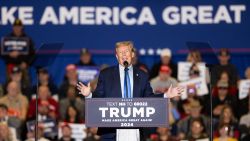On Thursday, it became official: The Senate impeachment trial into President Donald Trump is underway.
While the ultimate outcome seems predetermined – it’s very hard to see 67 senators voting for Trump’s removal – that doesn’t mean the way we get from here to there doesn’t matter and won’t be potentially politically consequential.
While 67 votes are necessary to remove Trump, the rules governing the proceedings – including on the question of whether witnesses should be called – are determined by a simple majority. Which means that any coalition of 51 senators can overrule the wishes of Senate Majority Leader Mitch McConnell and, by extension, Trump.
With that in mind, here’s a look at eight senators to keep an eye on as the trial wears on. If there are going to be rebellions – even small ones – it’s likely to come from someone in this group.
* Lamar Alexander (R-Tennessee): Alexander is retiring at the end of this year, a move that makes him more likely to act on his own gut instincts. And those instincts lean toward protecting both the institution of the Senate and the Republican Party. Neither of those goals perfectly align with Trump’s own vision.
* Susan Collins (R-Maine): One of the last GOP moderates, Collins has voiced support for witnesses to be allowed to be called. But, remember this about Collins: She and McConnell have a very strong relationship. Think Brett Kavanaugh.
* Joni Ernst (R-Iowa): Ernst has kept a relatively low profile over her first term in office. That’s a good strategy given that she represents a traditional swing state. But it may be harder for her to avoid some tough votes in the course of the trial, votes which Democrats, who believe Ernst is vulnerable this fall, will be watching closely.
* Cory Gardner (R-Colorado): Gardner is up for reelection in 2020 in a state that went for Hillary Clinton In 2016. And he’s up against a top Democratic recruit in former Gov. John Hickenlooper. That’s reason enough to expect him to look for ways to show his independence and moderation in the course of the trial.
* Doug Jones (D-Alabama): If there’s one Democrat who might side with Republicans on any of the major upcoming votes in the trial, it’s Jones. After winning a special election in 2017, he has to run for reelection this fall in a state that is heavily Republican. Even if Jones votes, say, to acquit the President, he could still lose. So, does he throw political calculation out the window? Or not?
* Martha McSally (R-Arizona): McSally’s rude response to a simple question from CNN’s Manu Raju on Thursday suggests the pressure she is under in this trial. McSally is up for reelection this November and is behind her Democratic challenger in polls and fundraising. Plus, Republicans are worried about how Trump will perform in Arizona.
* Lisa Murkowski (R-Alaska): Murkowski may actually be the moderate that Collins presents herself as. Not only did Murkowski vote against Kavanaugh but she also got herself reelected as a write-in candidate in 2010 following a loss to a Tea Party candidate in the primary. If there’s a true independent in the Senate, Murkowski’s it.
* Mitt Romney (R-Utah): Romney, since coming to the Senate last year, has been – by far – the Republican senator most willing to question Trump and his decisions. Romney has also express support for hearing from witnesses – and, unlike many of his colleagues, doesn’t need to worry about how it impacts his home politics since he isn’t up for another term until 2024.
The Point: This trial – and the votes governing its rules – will be one of the major moments of every single one of these senators’ careers. Handle the politics of it wrong and it could spell the end of those careers.



















